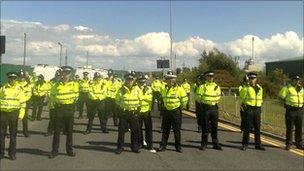Elected police commissioners - the pros and cons
- Published
- comments

The government argues the plan will reconnect the public with policing
It's one of the government's flagship policies.
But finding politicians who support the introduction of elected police commissioners in the North East and Cumbria is pretty tough.
You won't be surprised that Labour politicians are hostile.
It's probably not a shock to find most Lib Dems, external are also opposed. After all, it's not something that was in their manifesto.
Qualms and quibbles
Yet even though this is a mainstay of Conservative, external policy, there seems little support from the region's Tory councillors.
Some have qualms, and others grave doubts about replacing the current structure of police authorities with a single elected individual.
The government argues the plan will reconnect the public with policing, and make our forces far more accountable.
But its critics fear commissioners will politicise one of our most vital services - with commissioners interfering in policing for their own electoral gain. They are worried that it could also increase the risk of corruption.
Councillors' concerns
Perhaps though it's not surprising that our councillors don't like the idea.
Many sit on the police authorities the commissioners will replace.
These are organisations made up nine politicians nominated by the political groupings on the local councils and eight independent members, who are appointed by the Home Secretary, external.
None of them is directly elected, and a report that's recently been released, external suggests they are too weak to have much impact.
The thinktank yesMinister, external says they are often too in awe of the Chief Constable and the Home Office, external to stand up to either of them. It says they tend to collaborate rather than scrutinise.
It thinks elected police commissioners would be an improvement, and sees no evidence that they have led to increased corruption in countries where they operate. It is concerned though that there will need to be an effective way of scrutinising the work of such a powerful individual.
More democratic?
And at least one of the region's politicians is also firmly in favour of the idea.
Stockton South's Conservative MP James Wharton, external says commissioners would be more democratic. And he insists that Chief Constables would still retain full control of operational matters, limiting the potential for political interference.
Many in the police force though remain to be persuaded.
It's thought many current Chief Constables are worried, even though they can't publicly outline their concerns.
Certainly former chiefs like Sir John Stevens, external are openly opposed. The Police Federation, external is also hostile.
And this is a policy facing some difficulties.
Lib Dem lords rebelled this week to defeat the legislation that would introduce commissioners.
The government says it will press ahead regardless, but this is an idea that could be one potential target for Nick Clegg's new "muscular liberalism".
The Politics Show will be debating the merits of commissioners on 15 May at 12pm on BBC One.